#young gods spoilers
Explore tagged Tumblr posts
Note
3, 4, 13, 14, and 18 for jymaiyri?
oc ask game
ofc! my girl lives forever in my brain so i am happy to answer questions about her :]
3. weapon of choice? any particular reason they chose their weapon?
jymaiyri is among the minority of the savant in that she does regularly engage in combat, and when she does engage in combat she most often does so using her magic. one of my earliest concepts for the young gods magic system was change mages (the type of magic jyr has) using their magic to change what weapon they're using mid-fight. so, tldr- all of them. i feel like jymaiyri often defaults to certain weapons more than others- those certain weapons being paired shortswords, spears, and throwing knives. she's very light on her feet in combat, and will adapt quickly to whatever scenario she's in.
4. how crafty/resourceful are they?
jymaiyri is very resourceful. as explained above, her fighting style consists mostly of adapting to her situation on the spot, and this mirrors her approach to everyday, noncombatitive problems. jymaiyri's change magic lends itself to resourcefulness- rather than the spontaneous creation war mages can accomplish, change mages must work with what they're given. jymaiyri also has a very strong 'i'm going to crawl from the mud i was born in into the light of day' mindset, where she truly believes she's gained everything she has through her resourcefulness and wit. girlboss
13. what languages do they speak? how fluently?
languages are weird in young gods because i not only have to contend with different regional languages, but languages from different time periods. tho, roughly, i can say that jymaiyri is fluent in a handful of languages. her native tongue is an extinct dialect of old north lunarian, and she speaks middle lunarian and modern lunarian fluently, in both northern and southern dialects. the spoken language used throughout most of young gods is modern trade jalagone (an international lingua franca of sorts) so, for the purposes of plot, she's fluent in that too. she's mildly well versed (haha) in older dialects of regional jalagone, sky plains, loucari, and solarian languages, though she probably couldn't hold a conversation in the modern variations of those languages. i also like to think she knows a bit of old west loucari (the language juno speaks, which coincidentally makes him sound like a cowboy) as he would've taught her. linguistics is fun
14. are they any good with numbers?
of all the savant, jymaiyri is 4th best at math (she only beats sadihak). it's not that she's bad at math, she's just the type of person who can't keep numbers straight in her head or do mental math. and unfortunately the three other non-sadihak savant have their own reasons to be very good at math. petrai's entire passion is collecting dates and numbers and statistics, so she's very good at quick mental math. han's an architect, so he just knows how to do math well, and juno is so good at memorizationand just simply counting, he beats jymaiyri. for someone so dedicated to science, she is kinda bad at math. but she's not terrible. (sadihak is tho)
18. their opinion on lying, stealing, and killing?
these are three seperate answers
lying: jymaiyri has never and will never lie about anything. she values the truth and she holds it in high regard. she makes everything about herself very clear- if she has an opinion about you, you'll know. if she finds out that you've been lying to her, you're in a lot of trouble. jymaiyri does not take betrayal lightly, and thus would never betray or backstab anyone (unless she's already made it clear she hates them). when it comes to the truth, jymaiyri is a very open textbook. she knows what she wants, and she'll make sure you know.
stealimg: tbh i do not think jymaiyri would give two fucks about theft. she's against the theft of research and is for the theft of necessities but other than that i honestly dont think she'd care too much. living for thousands of years distorts one's perceptions of physical, personal property, i think.
killing: jymaiyri is pro murder as long as she can justify it. the most common justifications for her murders are 'for science' and revenge, with the occasional tree cannibalism thrown in. if she can't justify killing someone, she's against it, but those cases tend to be rare. jymaiyri believes that the ends justify the means, and accomplishing her goals is always a worthy ends.
feel free to send me more oc asks! this was a ton of fun :]
#jymaiyri ke naido#oc core#young gods#tw cannibalism#young gods spoilers#theyre mild and vague#innsjotxt#ask#venomorphs#ty minh for letting me ramble about the young gods linguistics worldbuilding there#long post
2 notes
·
View notes
Text
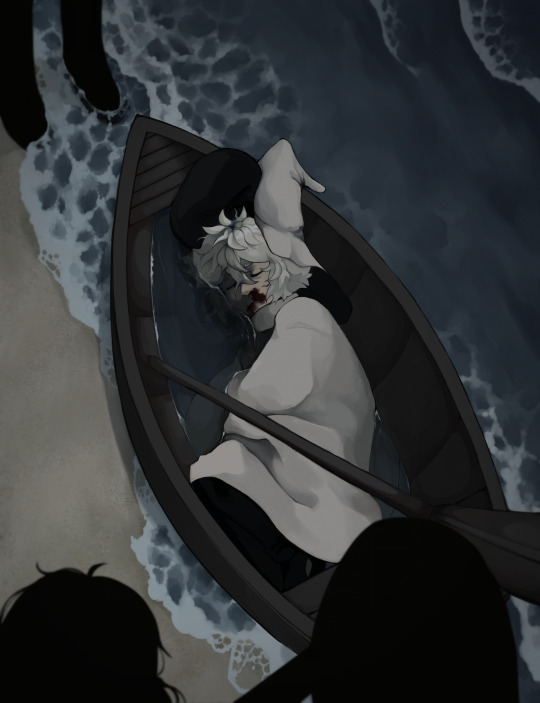
lost child
#in stars and time#isat#isat spoilers#isat siffrin#in stars and time fanart#isat fanart#i forgot to record the speedpaint :(#whatever im kinda proud if this one#anyone else thinks ab young siffrin right after the island dissappeared arriving in vaugarde with no knowledge of the language#of himself#or of how he ended up there#ever think about how scared and confused they mustve been#how it probably took them years to be able to communicate smoothly and be able to move freely#about how with the island not only did they lose their home and family and friends but also themselves#their personality#their language#EVERYTHING.#god siffrin u make me so sick i cant do this
2K notes
·
View notes
Text
/ ARCANE ACT 2 SPOILERS

PLEASE SILCO JUST ONE CHANCE PLEEEEEAAAAASEEEE
screenshot redraw <3 this is just a study because it’s actually my first time drawing him, but i hope i will get a chance to draw him again because ATHDGSGSHS …… HUUGGHHHH…… HNSHNSHSNSN I NEED HIMMMM PLEAAASEEENEJSNJSNJSN

#arcane#arcane fanart#arcane league of legends#arcane spoilers#arcane act 2#arcane silco#silco fanart#young silco#silco#oh btw#this isn’t my first time drawing silco because i only liked his young version#nah bro i liked him since rhe beginning#god i love him#silco please give me just one chance please
777 notes
·
View notes
Text

changing for the worse
#isat spoilers#isat#isat siffrin#dy art#small little siffrin makes me cry if i think about them too long#they were probably so young when the left their country#god.#in stars and time
989 notes
·
View notes
Text
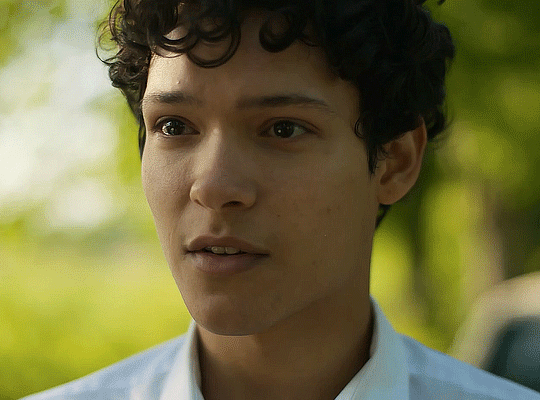
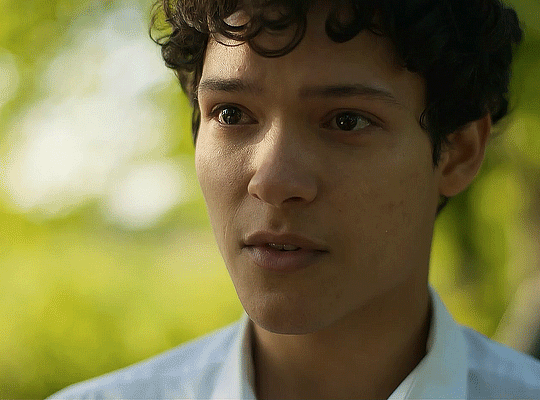
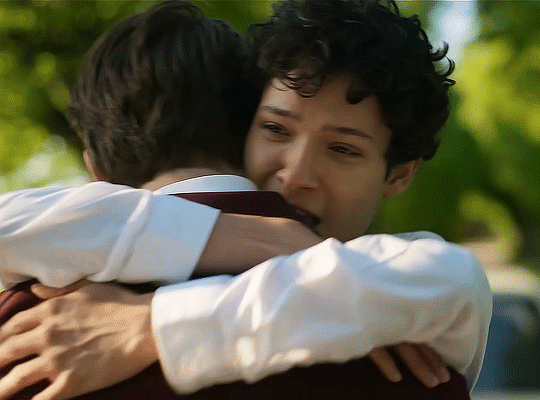

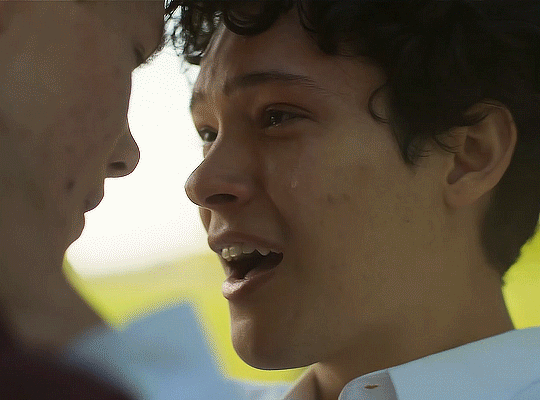
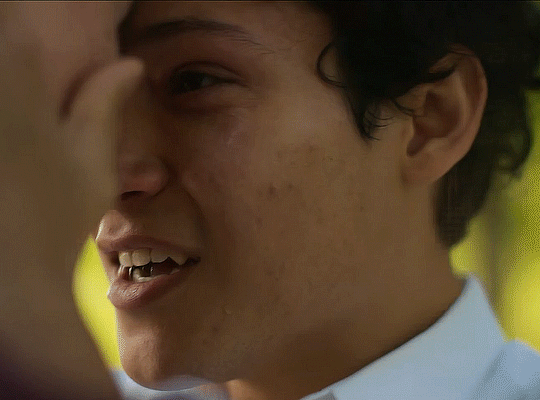
#guys i cant believe this is real this is everything ive ever wanted#WILLE ABDICATION??? WILMON ENDGAME??? wille is free he's free they're both free#look at simon's face oh my GOD#ive never seen him this happy euphoric and liberated#that's CINEMA!#i have so many things to say about this ending#“are you sure you're over me” “what the hell do you think”#when wille says “can you open the door?” as he leaves the car and leaves the cage that is the monarchy#the door is open!!!! there is sunshine on his skin!!!! he is free oh my god#i know i havent been making gifs im sorry i promise they are coming#good god that is Television to me#young royals#yr season 3#yr s3 spoilers#young royals s3#young royals season 3#wilmon#prince wilhelm#simon eriksson#omar rudberg#edvin ryding#wilhelm x simon#wille x simon
1K notes
·
View notes
Text

(Whit did, in fact, gaf, but he wasn't about to let anyone know that.)
#also known as: the beginning of 2-13 summarized#danganronpa despair time#drdt#drdt chapter 2 part 2 spoilers#whit young#levi fontana#fanganronpa#hello it's me putting whit in a meme again. i'm very predictable#trying to figure out how to mimic the class trial lighting was interesting. i think i got pretty close though#i wound up using a screenshot of the first canon dr class trial grounds instead bc i couldn't get a good screencap of the drdt one#but this is the one with the same color scheme as the real one so idk if anyone would even notice that if i didn't say#also this is very clearly inspired by the “nothing in life matters” meme if ya couldn't tell :D#my art#fanart#drdt spoilers#oh my god I just realized I tagged this as dis/venture camp and not drdt spoilers#I am so sorry dis/venture campers
518 notes
·
View notes
Text





It'd be great to go back, wouldn't it?
#theboysedit#jackquaidedit#simonpeggedit#the boys#the boys spoilers#jack quaid#simon pegg#rosemarie dewitt#daphne campbell#hughie campbell#hugh campbell#wee hughie#original#*gifs#god this scene#jack! JACK!#they were all so happy :(#and hughie has never looked so young
524 notes
·
View notes
Text
i love annabeth. she deadass tricked percy into skipping through a field while holding a rainbow staff. i just know she ran away snickering underneath her breath lmao
#cotg spoilers#the chalice of the gods#chalice of the gods spoilers#percy jackon and the olympians#pjo#pjo text post#chalice of the gods#cotg#pjo cotg#annabeth chase#percy jackson#percabeth#percabeth textposts#funny percabeth moments#young love
2K notes
·
View notes
Text
y’all have no idea how much of a complete asshole MC is gonna be to break the ROs’ heart so they won’t be sad when they, inevitably, get dragged to hell die...

#how low will they stoop tho#that’s the golden question 👀#if: the ballad of the young gods#interactive fiction#interactive novel#interactive story#twine wip#ro: c lacroix#ro: v næsholm#ro: w ostendorf#ro: d diaconu#ro: m whitlock singh#spoilers
231 notes
·
View notes
Text

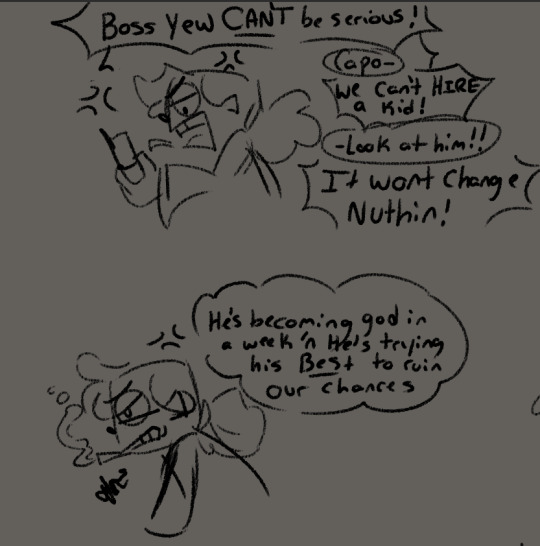
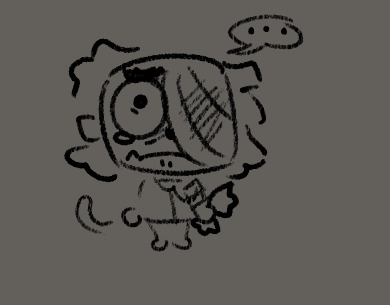
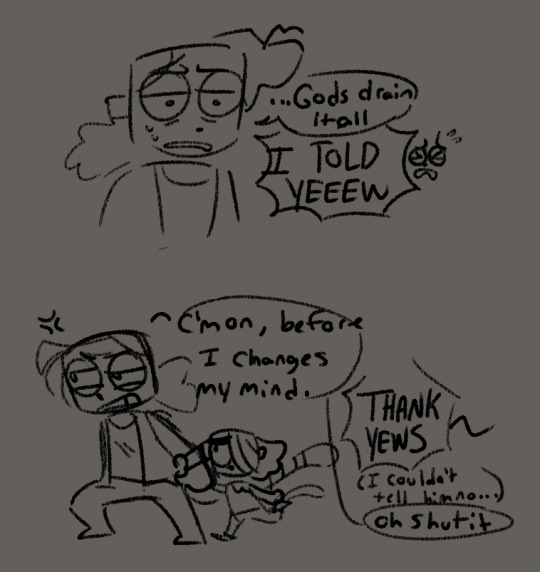
my personal headcanon for Grujaja joining the bizzyboys really is just that he showed up asking to join really young and two exhausted campaigning 20 year olds were like "DUUUUUUUUUDE WE CANT LEAVE THEM HERE IT SUCKS HERE. "
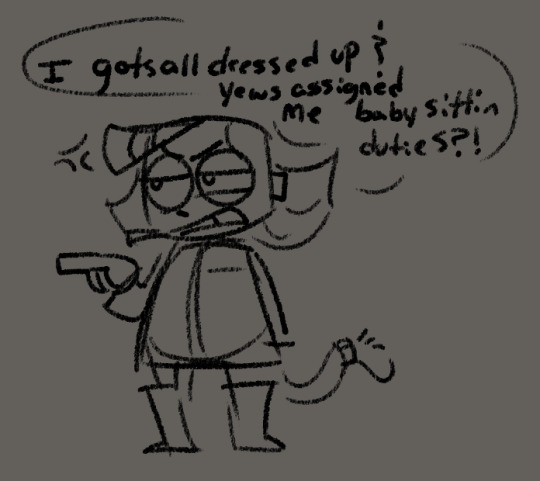
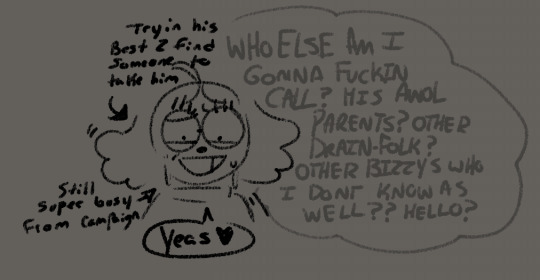
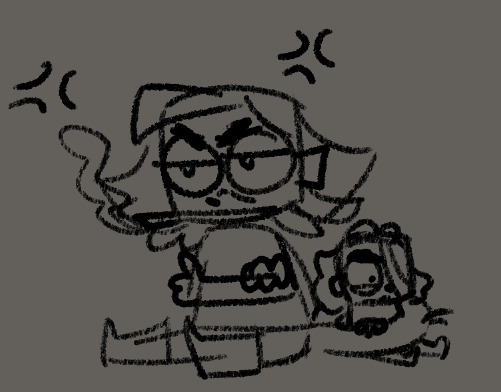
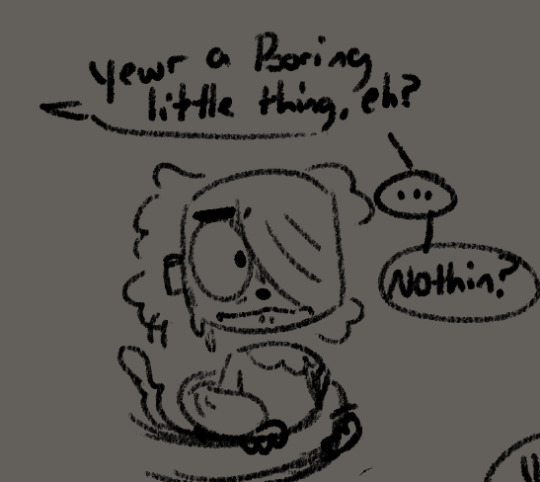
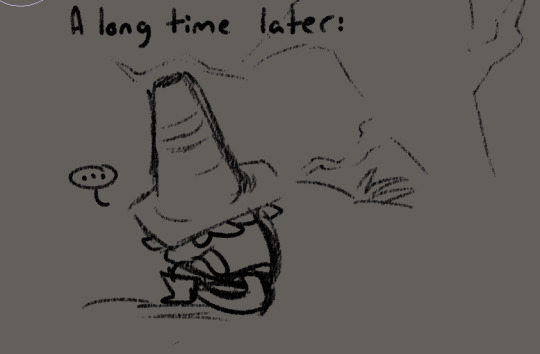
type of guy that escapes one bad situation and it snowballs him into another. How would you NOT blindly (semi literally haha) follow the people and group who took you in.
#ggg spoilers#great god grove#ggg hector#ggg capochin#ggg grujaja#ggg gr#[points at gruja] im bestowing you the highest honor i know... traumatized autistic person#this makes him late 30s to early 40s game timeline wise for clarification btw#but yeah grujaja being very passionate about following inspekta and being afraid of the world very much gave me specific vibes#of someone brought in very young after a traumatizing event and idolizing people who helped him#this started as a silly little headcanon and now im sitting here. head in hands. hate it heres man#sorry hector and capo for my headcanon making u babysit a guy for half a week. had to happen because its funny to me#also because it lets me draw tiny gruja and it brings me joy
201 notes
·
View notes
Text

I must confess, it’s growing on me. I love him as the sad little egg he is, but that ginger hair is just 👌
#solas spoilers#solas#fen’harel#the dread wolf#my poor Oressa wouldn’t stand a chance against young solas#she didn’t with ancient solas either tho#we love ourself a ginger boy#ofc they make the trickster god ginger#i hope the hair matches his temperament#we want young hot blooded solas
211 notes
·
View notes
Text
THE WITCHES’ ROAD WAS HIS WANDAVISION?!
#I CANNOT SCREAM LOUD ENOUGH OH MY *FUCKING GOD*?#IT WAS NEVER REAL#HE *FUCKING* MADE IT REAL#I’M?!#I HAVE NEVER BEEN SO *FUCKING* GAGGED IN MY *LIFE*?!#BILLY MAXIMOFF#WICCAN#BILLY KAPLAN#YOUNG AVENGERS#WANDAVISION#JAC SCHAEFFER#agatha all along spoilers#aaa spoilers#agatha all along#agatha all along finale#aaa finale#lgbtqia
186 notes
·
View notes
Text
The Raven Queen came to the god of death before her in his frozen enclave. They danced through words over the years and while at first he may have seen her as a disciple, eventually they became friends, and she thinks she loved him at the end. They worked together to craft the Ritual of Ascension, and now he is at peace, though his ghost may live on in the cold of winters, in the darkness at the corners of the world, and she cares for him still in the way she cares for all beings
#critical role#cr spoilers#cr3#cr lore#the raven queen#RAVEN QUEEN I LOVE YOUUUU#WHAT DO YOU MEAN YOU LOVED A GOD AND WITH HIS AGREEMENT UNDID HIS VERY EXISTENCE#GIRL W H A T#what I wouldn’t give to have a raven queen origins where she’s a brilliant ambitious young woman who comes to love death#and because of that love she undos and becomes it#ok!!!!
184 notes
·
View notes
Text

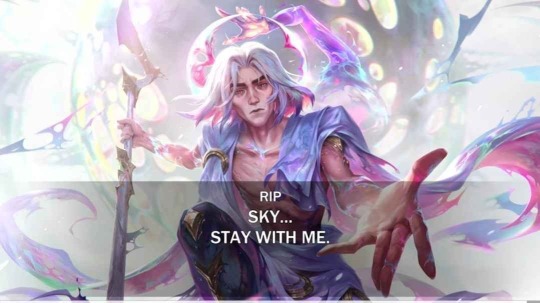
Riot and Fortiche should come to an agreement on how Viktor addresses Sky, bc my heart is not handling this
#im accepting theories about why Viktor keeps calling her ms young in arcane#after 3-6months togehter + hugs and hand holding#as an ace my heart is not handling this#too much emotions god#arcane#viktor#arcane viktor#viktor arcane#arcane netflix#arcane sky#sky young#viktor x sky#arcane spoilers#arcane season 2
139 notes
·
View notes
Text

I love Viktor I wish evolution was real☹️
#arcane#viktor arcane#arcane season 2 spoilers#arcane season 2#young viktor#god viktor#viktor jesus#veektor#viktor#tbh if i looked like viktor if transitioning ever happened then i may consider admitting#arcane viktor
141 notes
·
View notes
Text


1.04 | 3.03
#young royals#yr s3 spoilers#avi’s gifs#simon eriksson#prince wilhelm#wilhelm young royals#simon young royals#wilmon#wilhelm x simon#the tenderness i swear to god i will never get over it#crazy how these two invented intimacy#young royals season 3#young royals season 3 spoilers#yr s3#yr parallels
399 notes
·
View notes